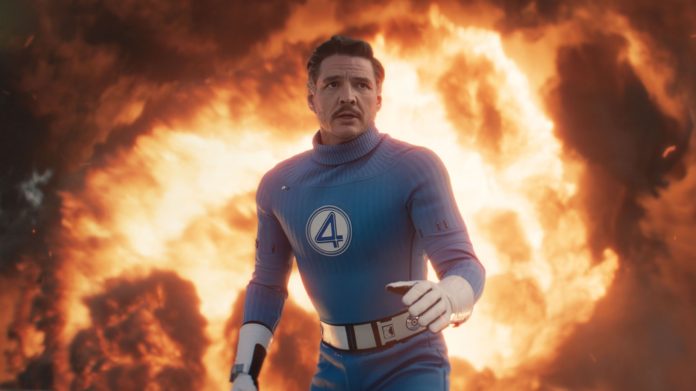
Marvel Studios’ long-awaited debut of its “first family,” “The Fantastic Four: First Steps,” arrives in theaters with a dazzling retro-futuristic vision and a talented cast but ultimately struggles to break free from the familiar and weightless patterns of modern superhero storytelling.
Directed by Matt Shakman, the film skips the typical origin story, picking up four years after a group of astronauts gained extraordinary abilities from cosmic rays. They are now celebrated heroes in an alternate 1960s universe, Earth-828, a world of flying cars and mid-century modern design that feels ripped from the pages of a classic sci-fi magazine.
The film’s greatest strength is its aesthetic. The production design, a vibrant “Jetsons”-meets-“Mad Men” palette, is a character in itself. From the sleek and rounded interiors of the Baxter Building to the neon glow of a fictionalized Times Square, the world is immersive and uniquely charming. Michael Giacchino’s energetic, optimistic score perfectly complements this tone.
The core cast delivers solid, if occasionally underutilized, performances. Pedro Pascal brings a weary intellect to his character, Reed Richards, while Vanessa Kirby grounds the team as a pregnant Sue Storm, Founder of the Diplomatic Future Foundation. Joseph Quinn provides comic relief as the hot-headed Johnny Storm and Ebon Moss-Bachrach effectively conveys the melancholy and loyalty of the rock-covered Ben Grimm, a standout performance largely achieved through motion capture.
The plot, however, fails to match its innovative setting. The threat comes from Galactus (Ralph Ineson), a colossal cosmic being who devours planets, heralded by the Silver Surfer (Julia Garner). While the scale is epic, the execution feels familiar. The film falls into the common trap of establishing a world-ending crisis so immense that the resolution feels inevitable and lacks genuine suspense.
Critics of the genre will recognize the formula: a massive threat emerges, the public briefly turns on the heroes and a solution is engineered—in this case, a planet-wide teleportation device—that is almost comically complex. The final confrontation in New York City, while visually impressive, resolves with a predictability that undercuts the power of its villains. As one critic noted, it makes a being more powerful than Thanos seem “like a pretty lame supervillain.”
The film is packed with fun moments and witty banter, particularly a recurring bit with the team’s robotic assistant, H.E.R.B.I.E. Yet these elements often feel like scattered highlights rather than parts of a cohesive narrative. The emotional beats, particularly around Storm’s pregnancy and the family’s bond, are present but don’t land with the intended weight, leaving the audience appreciative but not deeply invested.
The question “The Fantastic Four: First Steps” poses is not about superhero fatigue, but superhero formula fatigue. It demonstrates that even with a fresh coat of paint and a talented team, a by-the-numbers script and a lack of real narrative risk can make even the most fantastic concepts feel ordinary.


